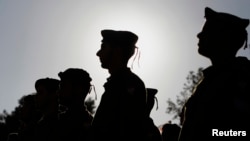A U.S. review will decide whether certain Israeli military units violated the human rights of Palestinian civilians in the West Bank before the October 7 Hamas terror attacks on Israel, making them ineligible to receive U.S. military assistance.
A source familiar with the investigation told VOA on Friday that the “process continues to be ongoing” and is consistent with a memorandum of understanding between the United States and Israel that requires Washington to consult with Israeli officials prior to any conclusion.
The Israeli government will continue to receive U.S. military aid during the review process, in which the State Department is assessing whether the Israel Defense Forces are taking appropriate steps to remediate any violations.
There will be restrictions on the provision of U.S. military assistance if it is determined that there has not been appropriate accountability and remediation taken by Israel’s military, according to the source.
The review process has drawn sharp criticism from Muslim rights groups who say the Biden administration has not done enough to hold Israel accountable for human rights violations against Palestinian civilians.
Some analysts also have said the protracted process indicates the “special treatment” that Israel continues to receive from the United States.
The Leahy Law
The review is being conducted under a U.S. law known as the Leahy Law, which prohibits U.S. funding from going to foreign security units implicated in severe human rights violations.
However, exceptions exist, such as when a foreign government addresses the issue through “remediation” as well as when the U.S. equipment is used for disaster relief.
The State and Defense departments have a joint remediation policy allowing resumption of assistance if the foreign government is effectively addressing the violations through investigations, adjudications and proportional sentencing.
On Thursday, State Department deputy spokesperson Vedant Patel said the Biden administration takes “extensive steps to fully implement the Leahy Law” for all countries that receive applicable U.S. assistance.
“That, of course, includes Israel, with whom we have a long-standing security relationship,” Patel told reporters during a press briefing.
U.S. officials declined to identify the units under review, but Israeli media said they include Netzah Yehuda, a military unit made up mostly of ultra-Orthodox Israeli soldiers that operated primarily in the West Bank before it was reassigned to the northern border in 2022.
The allegations related to the IDF units were based on incidents that took place before the October 7 Hamas terror attacks on Israel. They are not connected to Israel’s military operations in Gaza after October 7, nor to actions against Iran and its proxies.
One incident involved the death of an elderly Palestinian American, Omar Assad, in January of 2022.
The Biden administration’s review process has drawn scrutiny from Muslim civil rights groups.
In a statement, the Council on American-Islamic Relations Deputy Director Edward Ahmed Mitchell said: “Sanctioning this unit is the least the Biden administration should have done, and suspending military aid altogether is what the administration should do now.”
The Council on American-Islamic Relations, or CAIR, is the largest Muslim civil rights and advocacy organization in the U.S.
Blacklisted foreign security units
If foreign security units are blacklisted by the U.S. because of serious human rights violations, they cannot receive U.S. military assistance, use U.S. weapons, or participate in U.S. training.
However, technically, the foreign government can use its own funds to purchase U.S. weapons and issue them to any unit it chooses, according to analysts.
“It’s not really a sanction or a punishment. It’s the way in which Congress frames its laws to advance certain values, like human rights in this instance,” Sarah Harrison from International Crisis Group told VOA.
“The fact that the State Department is now slow-rolling its decision underscores this exceptional treatment that Israel continues to receive,” Harrison added.
Pro-Palestinian protests by US college students
The investigation comes amid rising international anger over the high death toll and suffering among Palestinian civilians in Gaza during Israel’s drive to destroy the militant group Hamas, whose October 7 attack in Israel claimed some 1,200 Israeli lives.
U.S. college students have staged pro-Palestinian protests on campuses across the United States.
Asked about the protests during a press conference Friday in Beijing, U.S. Secretary of State Antony Blinken said that in America, it is a “hallmark of our democracy that our citizens make known their views, their concerns, their anger at any given time, and I think that reflects the strength of the country, the strength of democracy.”
“This could be over tomorrow, it could have been over yesterday, it could have been over months ago, if Hamas had put down its weapons, stopped hiding behind civilians, released the hostages, and surrendered, but of course, it has chosen not to do that,” Blinken said.
“And it is also notable that there is silence about Hamas” from the students.
VOA White House Bureau Chief Patsy Widakuswara and VOA White House Correspondent Anita Powell contributed to this story.




